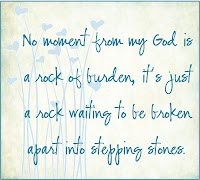Thursday's Therapy
"To Let-Go" or "Not to Let Go"?
- That is the Divisive Question
We have strong reactions to some of the following words of advice about how to handle the grief process. We would love to get your all's feedback about how any of this advice strikes you. But we are including both sides of the "Let Go"/"Not Let Go" arguments as these are some of the words of counsel you are likely to get from those who think they are "helping" you with your grief…
First, the "Let-Go" Advice:
Norman H. Wright in his book Helping Those in Grief has a chapter called, "Helping Grievers Move On in Life: Recovery." In this chapter, there are some interesting recommendations…
"Beginning to Let Go
"A person in grief can also move forward in the letting-go process by writing a "Letting Go" letter. This generates feelings, but it releases them as well. It moves them along the recovery process and brings healing. Some read their letter out loud by themselves or to a trusted friend. The content of the letter could contain details about one of the most special times they ever experienced with their lost loved one; what they miss, what they wish, what they wish they could still talk about; what has been most difficult during the time of grief; what they will do to remember the one who has died; and what has been learned through this life. These subjects may bring up others to write about. Have the counselee conclude the letter by stating that he or she is in the process of letting go and experiencing life again. Remember, this is an honest expression.
(Below, Norm is quoting from Doug Manning who wrote Don't Take My Grief Away From Me)
"Perhaps they've been in their grief for a while. There are two questions that will need to be addressed at some time or another. They are different, even strange:
"1) Has the person committed himself/herself to a certain amount of time to grieve? Some do that unintentionally and some do it intentionally. One may have heard that it takes two years to grieve if it is a natural death, three for accidental death. Don't let any of these suggested time frames dictate recovery time. Don't set a time frame unless it's all the time that was needed. Keep it open-ended.
"2) Has the person given himself/herself permission to stop grieving at a given point in time in the future?
"Think about it. People in grief will need to give themselves permission to stop grieving. Throughout grief they will say goodbye to the one they lost, and eventually say goodbye to grief." (Manning, 1979)
Norm continues, "Remember, life is a series of hellos, goodbyes, and hellos."
Then, Norm quotes from Joyce Rupp in her book, Praying Our Goodbyes:
"Most goodbyes carry a sense of sadness, a feeling of 'I wish it wasn't so.' Do we ever look forward to goodbyes or get used to saying the word? Probably not. Many goodbyes lead to heartache. The word 'goodbye,' originally 'God be with you' or 'Go with God,' was a recognition that God was a significant part of the going. Perhaps we have forgotten that along with the journey we gain strength when we remember that the Giver of life is there to protect and console, especially when the goodbye is because of death (Rupp, 1988)."
~~~~~
Now the "Not Let Go" advice:
Healing Grief, Finding Peace: 101 Ways to Cope with the Death of Your Loved One by Dr. Louis E. LaGrand has quite the opposing message:
"The Most Damaging Myth
"The myth with the longest-lasting and most hurtful consequences is this: you must let go of and sever ties to the deceased, find closure, and get on with your life. Closure usually implies closing the door of memories and the relationship. Not possible. True closure really means
"(1) accepting the absence of your loved one's physical presence,
"(2) releasing willful suffering, and
"(3) letting go of your old life while accepting the new one in a different relationship with the deceased.
"Adherents to the monster myth of 'letting go' have usually been heavily influenced by those in the mourner's support system; these care-givers have grown tired of the ongoing pain and repetition of the grief process and want you to 'get on with your life.'"
~~~~~
Do you lean toward one or the other side of these very different counsels?
If so, which one, and why?

Picture: http://tannermorrow.deviantart.com/art/girl-holding-balloon-51061778











































1 comment:
Post a Comment